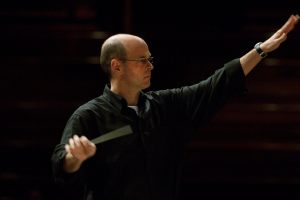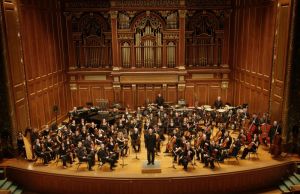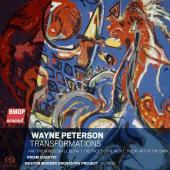
Gil Rose directs the Boston Modern Orchestra Project, or BMOP. The orchestra’s in house label, BMOP/Sound, has released a spate of vital CDs of American music. I recently interviewed Rose about recordings already released on the label and a preview of the rest of 2018’s live and recorded events.
In recent years, BMOP has released several recordings that “crossover” into pop, what some writers have described “Indie classical.” Which of these projects do you think have most effectively helped the ensemble to grow musically? Do you approach conducting differently when a groove supplied by a rhythm section or drum kit is part of the proceedings?
Several projects come to mind including Eric Moe’s Kick and Groove both discs we did of Evan Ziporyn’s music and Tony Di Ritis Devolution. I think that when you have a “kit” involved listening is at a premium. At that point its important to share the stage with the drummer and try not to be a groove buster while keeping all the proceedings together. I think there is a lot of trust in the orchestra which empowers the players. That always brings out their best. I think we saw this at its best in our recording of Mackey’s Dreamhouse.
I found BMOP’s Wayne Peterson recording to be fascinating, both because theIre isn’t a comparable disc of his orchestra music and because of the history of his Pulitzer prizewinning piece “The Face of the Night, The Heart of the Dark.” At the time that he won the award, there was some controversy because Ralph Shapey was one of the other finalists and was told his work was rejected in the finals after being recommended by the music subcommittee. He got mad and was very public about it. Listening to the two pieces, they are certainly different but are in the same pocket, relatively speaking: One wonders what all the fuss was about Peterson winning. Did you two discuss the Pulitzer situation at all or do you have any insights?

I never have discussed the Pulitzer “incident” with Wayne. I think the piece is a knockout all by itself. It’s those American orchestral “Tone-Poems” that was likely to be forgotten in spite of the Pulitzer history. Robert Erickson’s Aurorus in the same ilk. There are MANY others. Great works that have been left behind because they require a virtuosic orchestra to pull off but major American orchestras are unwilling to take them on for reasons that personify the stagnation of our orchestral culture.
Paul Moravec’s ‘secular oratorio’ seems to share an affinity with some British pieces in a similar vein: Tippett and Vaughan Williams, for example. Was that on your mind at all when preparing the piece for recording? Congratulations, by the way — it seems like a very challenging work — tough vocal parts as well as an ambitious orchestration — and BMOP/NEC pulled it off without a hitch.
I think you are right to point out the connection to English Music. Though the piece is written for full orchestra it relies primarily on the strings. It gives it a sheen that makes it very exposed for the singers. Also the the vocal writing is tricky because the tonality is extended in the direction of chromatasicm which makes the tunig hard for the singers while they still have to sound lyrical. The subject matter is a challenge as well. The piece luckily (through clever design) has a few lighter moments as well as a good bit of hope to go along with the considerable pathos.
For Innova, BMOP and you recorded Ann Millikan’s “Symphony,” which deals with someone close to her battling cancer? Will you please tell us a little more about the impetus for this piece and the way in which you interpreted its very personal story?
Ann approached BMOP about making a recording of what for her was a very personal work. We were honored that she thought of us. Although the piece is dedicated to, and about someone who died, it actually is more of a portait of his interests and activities. It sort of functions as a celabration of his loves and life. I tried to bring out the character of each movement and how they related to the subject.
Del Tredici’s Child Alice is one of an extensive series of his pieces that are based on Lewis Carroll? How do feel that his take on the stories of ‘Alice in Wonderland’ and ‘Alice Through the Looking Glass’ are inhabited in the music of “Child Alice?” What did you do to prepare yourself and the musicians for dealing with the particular sound world and quirky expressivity of the piece?
I think the Alice stories and characters gave David the chance to deal in a kind of deep psychological exploration while at the same time show his sheer showmanship. His understanding of how music works at technical and sonic level when married his great sense of theater and sheer insanity creates an experience that you can’t prepare for. All I told the players was buckle up as your about to go several Rabbit Holes at the same time.
Looking ahead to 2018, what are some of the recordings and activities to which BMOP listeners can look forward?
In 2018 we have a full slate of concert and releases. We did a tribute to Joan Tower in February, In April were world premieres by Lei Lang, Anthony Di Ritis, Huang Rou followed by performances at the Library of Congress and June in Buffalo. Upcoming releases include works by Charles Fussell & Peter Child the complete orchestra works of Leon Kirchner, a great Chen Yi CD and Tobias Picker’s Fantastic Mr. Fox and a few other surprises.

Information about BMOP’s first Fall concert is below.
______________
Boston Modern Orchestra Project (BMOP) Kicks Off 2018-19 Season with Four Boston Premieres
When: Friday, October 19, 2018, 8:00pm
Where: NEC’s Jordan Hall, 30 Gainsborough Street, Boston
Who: Boston Modern Orchestra Project led by conductor Gil Rose with soloists Hannah Lash (harp) and Colin Currie (percussion)
What: Four Boston Premieres:
Steven Mackey – Tonic
Hannah Lash – Concerto No. 2 for Harp and Orchestra
Hannah Lash, Harp
Harold Meltzer – Vision Machine
Steven Mackey – Time Release
Colin Currie, Percussion

